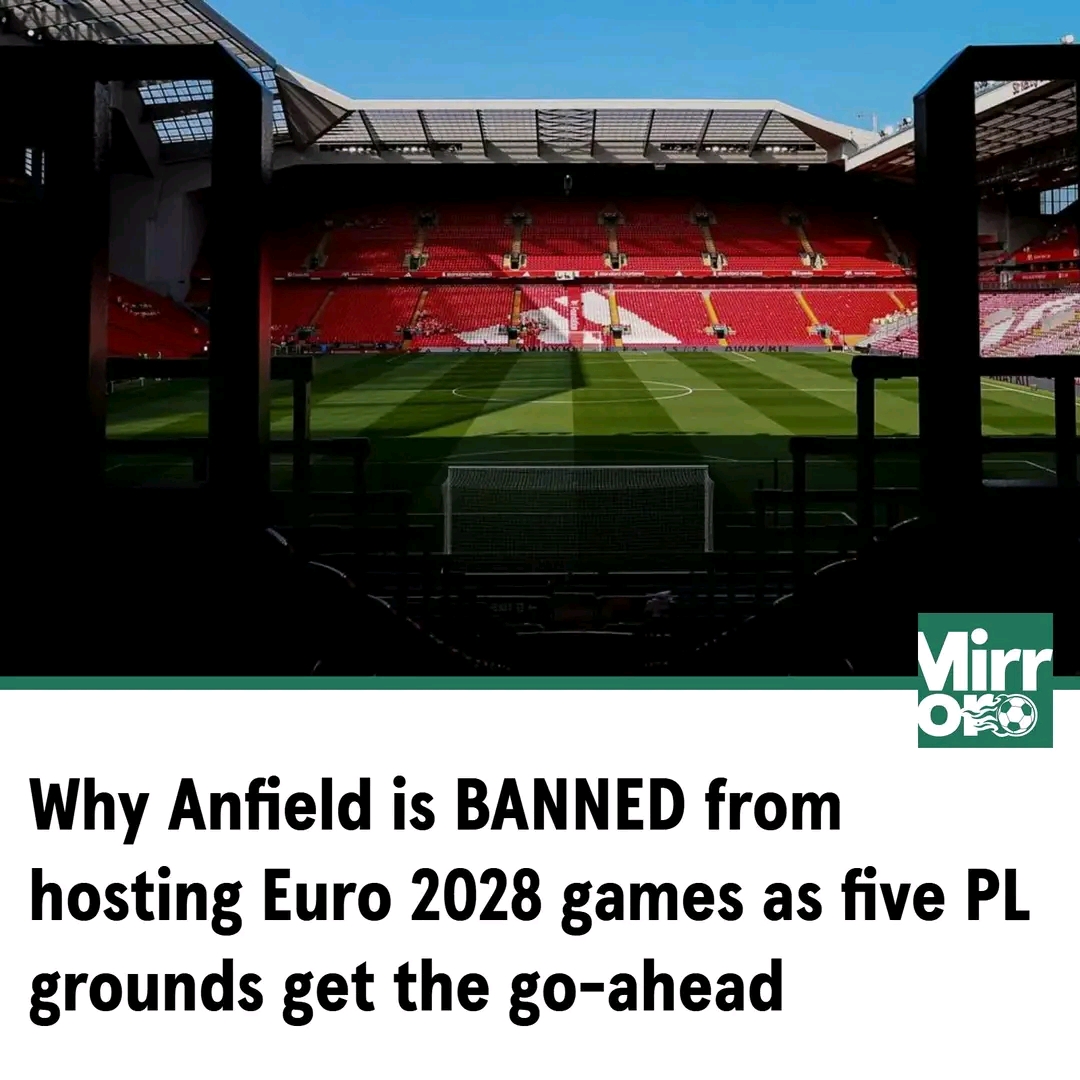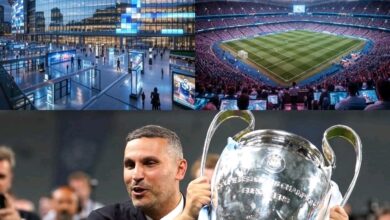Five Premier League grounds will host Euro 2028 games – but Anfield is not one of them

The countdown to Euro 2028 has already begun, and excitement is spreading across England, Scotland, Wales, and Ireland as the biggest football event in Europe prepares to land on British soil. Every announcement, every update, every stadium decision has been met with debate, celebration, or disappointment. And in the middle of all the noise, one stadium has become the center of heartbreak and confusion. One stadium that many believed could never be left out of a tournament hosted in the UK. One stadium that is not just a football ground, but a symbol of history, passion, and unforgettable nights. That stadium is Anfield.
People expected Wembley to be there. People expected the Tottenham Hotspur Stadium to be there. Of course, Aviva Stadium in Ireland, Hampden in Scotland, and Cardiff’s Principality Stadium in Wales were never in doubt. Even Manchester City’s Etihad Stadium, Villa Park, St James’ Park and Everton’s new Hill Dickinson Stadium made the list of nine grand venues chosen for Euro 2028. But as the full details were released, millions of eyes scanned through the stadium list and suddenly stopped. There was confusion. There was silence. There was shock. Because Liverpool’s Anfield, one of the most iconic stadiums in world football, had not been selected.
For a few seconds, the reaction felt impossible to understand. How could a stadium known for Champions League magic, for European nights full of electricity, for fans singing louder than thunderstorms, fail to make the cut for the continent’s biggest football competition? How could a stadium that has undergone major redevelopment, now capable of hosting more than 61,000 people, not be chosen?
Many fans jumped to conclusions, believing Liverpool had rejected the hosting offer or that UEFA had chosen Everton’s Hill Dickinson Stadium instead. Some even spread wild theories online saying the FA had issues with Liverpool. But the truth is none of that. The reason is much more technical, much more frustrating, and for Liverpool supporters, much more painful. Anfield was left out not because of politics, not because of stadium loyalty, not because of choices, but because of a measurement. A measurement that cannot be ignored, cannot be negotiated, and cannot be changed before the tournament.
UEFA has a clear regulation. The field of play in the Euros must be the standard dimensions: 105 meters by 68 meters. No exceptions. No special approvals. It is a rule written in stone for major finals and tournaments. Anfield, despite its beauty, its history, and its atmosphere, does not meet that requirement. The length of its pitch is 101 meters, just four meters shorter than the standard size. And because of this single detail, the stadium is disqualified from hosting Euro fixtures, just as it has been in the past from hosting UEFA finals like the Champions League or Europa League final.
To some, four meters sounds like nothing. Four meters is smaller than the space occupied by a handful of cameramen. Four meters could be the gap behind goal advertising panels. Four meters feels heartbreaking because Liverpool fans know that if it were possible to change, it would have been changed already. But expanding the pitch at Anfield is not a simple task. The stadium’s structure and stands sit very close to the pitch. Extending the field would require repositioning entire stands and the stadium design simply does not allow it, even after redevelopment. The intimate closeness of the stands — one of the reasons Anfield is so intimidating for visitors — is also why it cannot host Euros.
It is a situation filled with irony. The fortress-like shape that makes Anfield magical on Champions League nights is also the reason it keeps losing hosting rights for major international tournaments. And so, when the stadium list was announced for Euro 2028, Anfield was forced to watch from the outside, even though Liverpool itself is still a host city. The city will welcome the world, the fans, and the celebration, but the games will take place across town — at Everton’s new Hill Dickinson Stadium.
That detail alone added emotional tension that nobody could ignore. Liverpool’s stadium will sit empty during Euro 2028 while Everton’s ground will be packed with fans, cameras, and global attention. For rival supporters, this became a talking point. For neutrals, it became an interesting debate. For Liverpool supporters, it became a wound. They know that Anfield deserves nights like that. They know that the stadium has hosted a quarter-final at Euro 1996. They know that legends were built there, that miracles happened there, that the world connects with the word “Anfield” in a way very few stadiums can replicate.But the regulations are regulations, and even history cannot break them.
People have pointed out how Old Trafford also missed out due to private stadium issues and delays behind the scenes. Stadium politics are everywhere, but Anfield’s case is simpler. It was not politics. It was not money. It was not preference. It was the pitch. And when something is written in UEFA rulebooks, it is not a battle any club can win.
Euro 2028 will still be historic. England could play group-stage matches not only at Wembley but also in Manchester or Newcastle depending on progression in the tournament. Fans across the UK and Ireland will have the chance to watch international football on home soil. Memories will be made. New heroes will rise. But somewhere in the background, as people celebrate goals in different stadiums, the image of an empty Anfield during a home tournament will be a reminder that football is not only about trophies and results. It is about places too.
The roar of the Kop, the banners waving, the energy during You’ll Never Walk Alone — they are not just football symbols. They are pieces of identity, pieces of culture, pieces of football without borders. So many players from around the world have admitted that Anfield is the stadium where they felt football differently. Coaches have described the atmosphere as frightening and magical at the same time. And yet that stadium will not be part of a tournament hosted in its own country, while others get the spotlight.
Some Liverpool fans have expressed fear that the younger generation will grow up without knowing what it feels like to host a major international game in their home stadium. Others believe that one day Anfield will be redesigned to meet global standards, but the truth is there is no plan for pitch enlargement. The design of the stadium has always protected its soul — the closeness of the fans to the field. And as long as that remains part of Anfield’s identity, then Euro finals and Champions League finals will continue to be hosted somewhere else.
It is a heavy situation because nothing is wrong with the stadium. It has been rebuilt, modernized, expanded, beautified, and prepared for the future. The noise inside on big nights has never been louder. The stadium is more powerful than ever. But power is not what UEFA measured. Beauty was not a factor. Atmosphere did not count. Magic was not part of the selection criteria. Only measurements.
This story shows how football sometimes has no emotion when making decisions. A stadium filled with decades of football memories can be pushed aside by four meters of space. A pitch that has seen some of the greatest comebacks in European history cannot be used because it is shorter than a written rule.
In 2028, when people travel from country to country watching the tournament across nine selected venues, the world will talk about goals, victories, celebrations, and heartbreak. But in Liverpool, there will be another kind of conversation — a quiet conversation. A reflection on what could have been. Anfield will remain a fortress, a cathedral of football, a place where legends will continue to be created. But during Euro 2028, it will stand in silence while the world watches the matches somewhere else.
And even though Liverpool fans will support their national team throughout the tournament, the reality will always remain: when football finally came home with the Euros, Anfield was not invited to the party, not because it was forgotten, not because it was not iconic enough, but because football sometimes follows rules that have no heart.
Several people may move on quickly, but for Liverpool supporters, this memory will stay. They will not forget that their stadium deserved the spotlight. They will not forget that passion and history were not enough to overcome four meters. And they will always remember that even on the biggest stages, football can be cruel, not only to players and coaches, but sometimes even to the greatest stadiums ever built















